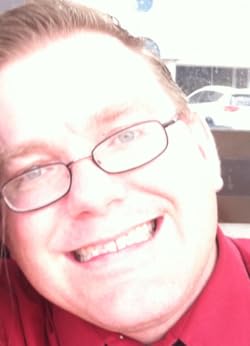NOT a tormented soul
MJN: After reading your bio on Amazon, I walked away with an impression that you as a person are a cross between Indiana Jones and Peter Pan. There is so much candor, passion and gusto in the way you talk about your writing. You are not a brooding, tormented, angst-ridden type. I picture a wide-eyed enthusiast, larger than life, who orders extra whipped cream and sprinkles on his ice-cream sundae. How far off the target am I?
BOR: Not too far off target but you can keep the sprinkles. I want the chocolate drizzle on top with a cherry. No I don't brood at all. My influences as you read are wide apart. I try to combine a little something for everyone in the Starshot Chronicles Saga.
Echoes of Star Wars
MJN: I must comment that the cover is very iconic, from the background image and the typography. I don't know what that font is called, but I think it's identical to that on the cover of Star Wars. The cover artist has clearly done his/her homework to appeal to a readership that will recognize and appreciate the genre. I don't see any characters depicted on the cover. Do you think it's better to depict some of the creatures or leave more to the readers' imagination?
BOR: Which font? There are two fonts on the cover. The one used for for the Starshot Chronicles name is GoodTimes the other is Optima. Goodtimes does look close to the font Star Wars uses but is not the same at all. Using the depiction of characters all depends on the images I feel is needed. And on the Royal Pains cover there are characters on it, in the cockpit of the shuttle leaving the planet.
What's in a name?
MJN: When you create an alternate universe, you have the freedom to mix, match, splice and alter images and elements from existing mythological pantheons. Some of the names are borrowed from Greek mythology - Athena and Minerva. Then you also have a character named Seth, the character from Egyptian mythology. Last but not least, you have a King Harold. Was there any deliberate symbolism/allusion behind the names?
MJN: When you create an alternate universe, you have the freedom to mix, match, splice and alter images and elements from existing mythological pantheons. Some of the names are borrowed from Greek mythology - Athena and Minerva. Then you also have a character named Seth, the character from Egyptian mythology. Last but not least, you have a King Harold. Was there any deliberate symbolism/allusion behind the names?
BOR: Behind the names of characters. The only ones that were deliberate in their connotation were Athena and Minerva. I came up with the name Athena first. I knew she was from Greek Mythology. So for the other handmaiden of Querilla, I chose her Roman name of Minerva. The others just come to me as the characters tell me there names. Harold, is an old kingly name from ancient time.
You can take humans off the planet ...
You can take humans off the planet ...
MJN: In your novel, you clearly have a hierarchy similar to that on earth. Even in extraterrestrial realms there are kings, princes, warriors, servants. In theory, you can come up with a planet with huge mice that hunt cats. The hunter/prey roles would be reversed. But there is always that hierarchy. Do you (along with other sci-fi authors) imply that human nature is the same everywhere, even on other planets?
BOR: I really don't imply anything about the hierarchy being similar to Earth. If you go to the about tab on starshotchronicles.com. You can read that there is no implication, I am down right saying yes. Starshot Chronicles, when we join them, is 6500 years ATP (After Terra Prime <Earth>). Man went out into space after abandoning the Earth around 3500 AD, we killed the planet. So we, humans, left in 7 arks which spread out amongst the stars and landed on various planets evolving into most of the species that populate the Starshot Chronicles universe.
The worst thing you can do to a princess is ... save her?
The worst thing you can do to a princess is ... save her?
MJN: I saved the hardest question for the very end. A few decades ago, "saving the princess" was a universally acceptable goal for the male protagonist in a sci-fi or an swashbuckling adventure novel. I'm sure you are aware of certain cultural shifts. Nowadays, if you let your male protagonist save the princess, you risk being accused of being macho and sexist. In order to stay on good terms with your female readership, you have to teach your princess some self-defense. She has to be able to operate intricate laser devices and repair space ships. I don't know how far feminism and political correctness have penetrated speculative fiction. Can you comment on the gender roles in your novel and contemporary sci-fi in general?
BOR: I've had feedback saying that readers did not really care for Querilla because she was so inactive, so delicate, so frail in Royal Pains. But her world flips upside down in Royal Ties therefore leading her down a path where she will gain immense power of her own. I am slowly plodding her usefulness on purpose. Her naivete to the surrounding universe is holding her back. She was overprotected as a child and until Douglas came into the picture, Querilla still acted like a kid. She grows up fast from Royal Pains to Royal Legacy as her powers begin to emerge on their own.


Thanks for the interview.
ReplyDeleteMy pleasure! Looking forward to the next book.
ReplyDelete